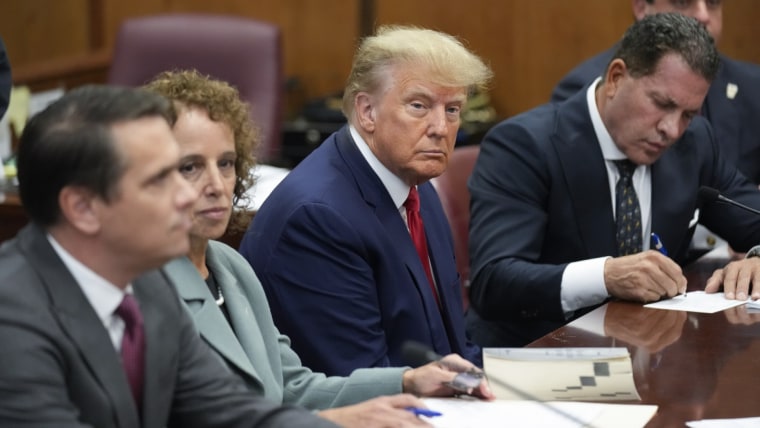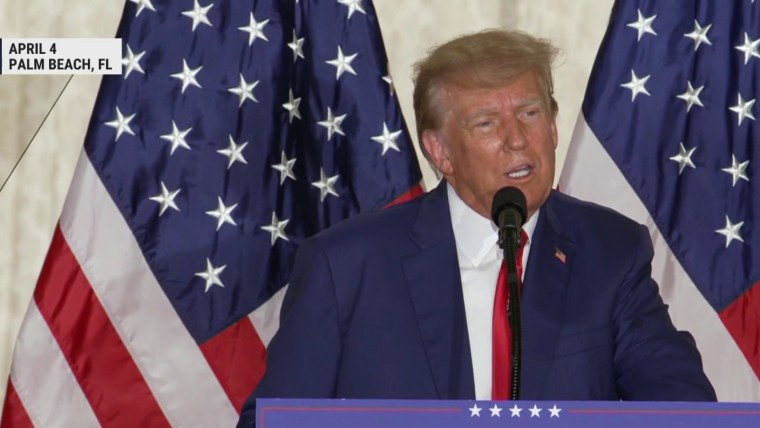In a criminal case, it is always critical for a prosecutor to explain to the jury the “why” behind the defendant’s criminal conduct. A juror will want to know why the defendant did what he or she did. Regarding former President Donald J. Trump, who was arraigned in a New York City courtroom Tuesday afternoon, Manhattan District Attorney Alvin Bragg used the statement of facts to do just that.
Upon reading the statement of facts, one can see an argument that Trump bought the 2016 election and, but for his scheme to defraud, he very well might have lost the Oval Office.
The felony indictment laid bare the 45th president of the United States’ scheme to “defraud and to commit another crime and aid and conceal the commission thereof.” And how did he allegedly commit these crimes? By making and causing the “false entry in the business records of an enterprise.” Per the charging document, the 34 different instances of falsification of those business records run the gamut from checks to pay for fake legal invoices to fake ledger entries in Trump Organization books.
Right out of the gate, in paragraph one of the 16-page indictment that sets forth 34 felony counts of falsification of business records, Bragg explains that Trump “repeatedly and fraudulently falsified New York business records to conceal criminal conduct that hid damaging information from the voting public during the 2016 presidential election.” After successfully suppressing that damaging information by way of hush money payments and “catch and kill” agreements with American Media Inc. (AMI), the parent company of The National Enquirer, Trump won the 2016 election and he subsequently used various falsified business records to hide and mask his conduct.

Upon reading the statement of facts, one can see an argument that Trump bought the 2016 election and, but for his scheme to defraud, he very well might have lost the Oval Office. Consider the following timeline:
- June 2015: Trump announces his candidacy for president of the United States.
- August 2015: Trump, along with Michael Cohen, his counsel and personal “fixer,” and David Pecker, the chair and CEO of AMI, meet at Trump Tower in New York City. They reach an agreement for Pecker to publish negative stories about Trump’s competitors and to be on the lookout for negative stories about Trump. They all agree that if those negative stories were to surface, then the National Enquirer would “catch and kill” them.
- October 2015: AMI, with $30,000 and an nondisclosure agreement (NDA), buys the silence of a former Trump Tower doorman who allegedly had information about a child Trump allegedly fathered out of wedlock.
- June 2016: AMI and Cohen, with $150,000 and an NDA, buy the silence of Karen McDougal, who allegedly had an extramarital affair with Trump while he was married.
- September 2016: Cohen secretly records Trump during a private conversation in Trump’s office during which they talk about how to funnel the money to McDougal. Cohen tells Trump that he and Allen Weisselberg, then-Trump Organization’s CFO, have discussed the logistics of the payoff.
- Oct. 7, 2016: News breaks of the infamous Access Hollywood tape within which Trump is recorded telling TV host Billy Bush about how he could sexually assault women by “grabbing them by the p----” and other horrific, nonconsensual moves.
- Oct. 27, 2016: Just a few days before the Nov. 8, 2016 presidential election, Cohen, with $130,000 and an NDA, buys the silence of Stormy Daniels, who allegedly had an extramarital sexual encounter with Trump while he was married.
- November 2016: Trump wins the presidential election and releases the doorman and McDougal from their NDAs.
That chronology of events set forth by Bragg, all involving Trump and allegedly done at his direction and for his benefit, makes evident that Trump bought the silence of several people in order to win the 2016 election. In other words, Trump bought the Oval Office through his repeated hush money payments to people who had damaging information about him that they were going to make public. Those payments in and of themselves weren’t illegal and would not have triggered criminal exposure. But, according to the Bragg indictment, Trump’s biggest, and criminal, problem is when he, with the assistance of Cohen, Weisselberg and others, and with the intent to hide the true nature of those payments, falsified several business records. If Trump didn’t have the financial wherewithal (which remains questionable to this day) to purchase the Oval, there is a very real possibility that he may have lost the election.
Trump’s immediate political future looked shaky and bleak in the fallout after the Access Hollywood tape was leaked. According to Slate, “The day after the tape was released, Mike Pence condemned what he heard.” One report noted that Mike Pence had to pray over it with his wife, and several members of Republican leadership begged Trump to withdraw from the race. Even one of his eventual-White House chiefs of staff, Reince Priebus, allegedly said to Trump: “You have two choices. You either drop out right now, or you lose by the biggest landslide in American political history,” according to Steve Bannon. But how much worse would it have been for Trump if the Trump Tower doorman, McDougal and Daniels all came forward and spoke publicly about Trump’s transgressions before the election?
Considering Trump’s history of two impeachments, several pending criminal and civil investigations, and now his first felony indictment (which is the first of many more to come), Trump should be wondering if the scheming and the fraud were literally worth it.

